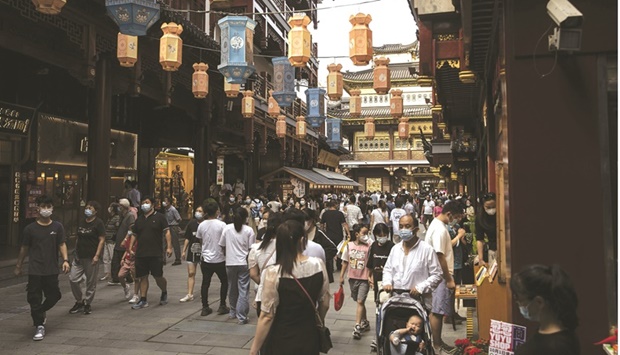Chinese holidaymakers cut back sharply on travel and spending during the National Day break this week as strict Covid rules discouraged movement, while signs of a consumer slowdown across Asia mount.
Tourism revenue declined 26% to 287bn yuan ($40.3bn) over the week-long holiday from a year ago. Compared with pre-pandemic levels in 2019, revenue was down nearly 56%, and even worse than last year’s 40% decrease from 2019 levels, according to figures from the official social media account of the Ministry of Culture and Tourism. Roughly 422mn trips were taken, down 18% from last year and 39% from 2019 levels.
The number of trips taken via railways, roads, water and planes during the break is also estimated down 36% from last year, state broadcaster China Central Television reported yesterday, with the daily average representing a decrease of 58.1% from 2019.
Despite recent calls to stimulate domestic spending, Covid curbs are still commanding the narrative for consumption. Air tickets this season were the cheapest in five years, and on average 12% lower than prices during Golden Week last year, according to local media, citing figures from booking site Qunar.com.
Cinema tickets also plunged, with sales reaching just 1.4bn yuan ($197mn) yesterday, according to online ticketing service provider Maoyan Entertainment. That’s less than a third of the box office for the full seven-day break last year, and also much worse than the nearly 4bn yuan earned in 2020.
The weak spending figures spell bad news for China’s consumer recovery at a time when economic growth risks are mounting. The slump in the property market shows no signs of easing, global demand for Chinese goods is slowing and the currency is plunging. Several economists say Beijing is unlikely to ease its Covid-zero policy until after March next year.
The deterioration in the world’s second-biggest economy coincides with a broader downturn across Asia in sectors from electric cars to memory chips and online shopping, and may indicate more weakness to come.
Samsung Electronics Co reported its first profit drop since 2019 as memory chipmakers face sharp declines in orders, with macroeconomic shocks to soaring inflation and rate hikes hammering consumer sentiment. Expectations that household budgets are getting tighter also prompted a rating downgrade and stock slump for online payment company Kakaopay Corp.
“High-frequency data covering China’s National Day holiday in the first week of October douse any hope that consumption is steadying - passenger rail traffic and cinema box office revenue plunged. A skid in home sales in the first three weeks of September added to the weak picture,” says David Qu, China economist.
Back in China, the formerly bright spot of EVs has taken a hit with shares of Chinese makers plunging in Hong Kong yesterday on predictions of worse-than-expected orders during the holiday period.

Visitors walk through the Yuyuan Garden in Shanghai. Chinese holidaymakers cut back sharply on travel and spending during the National Day break this week as strict Covid rules discouraged movement, while signs of a consumer slowdown across Asia mount.
